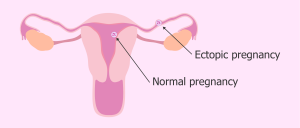 For more information, visit the original article: https://www.invitra.com/en/symptoms-after-embryo-transfer
For more information, visit the original article: https://www.invitra.com/en/symptoms-after-embryo-transfer
What is an ectopic pregnancy?
The Fallopian tube is the most common site for ectopic pregnancies, but they can also occur on the ovary or the peritoneal surface of the abdominal cavity.
An ectopic pregnancy is one which is implanted in a site outside the uterine cavity. The most common place for an ectopic pregnancy is in the Fallopian tube. The Fallopian tube cannot accommodate the expanding pregnancy so it leads to problems like pain and vaginal bleeding.
Is an ectopic pregnancy dangerous?
Ectopic Pregnancy in the Fallopian tube
Ectopic pregnancies virtually never result in a liveborn baby.
Most ectopic pregnancies are detected and treated early, before they become dangerous for the pregnant woman. But if left untreated, an ectopic pregnancy can rupture and this can be very dangerous.
How are they diagnosed?
Trans-vaginal ultrasound examination is the best way to diagnose an ectopic pregnancy. An intra-uterine pregnancy can usually be seen by 5-6 weeks gestation or when the HCG level is >1500 IU/l.
If it is not in the uterus, it may be ectopic.
In 95% of ectopic pregnancy cases, a good transvaginal ultrasound examination can actually see the ectopic pregnancy in the Fallopian tube. However occasionally the ectopic pregnancy is too small to be detected with ultrasound examination. Sometimes serial beta HCG levels and serial ultrasound examinations are required until the gestation sac gets big enough to see.
Sometimes there are other signs on ultrasound examination which are so suspicious of an ectopic pregnancy that the doctor will suggest a laparoscopy in order to see under direct vision. Some of the signs which are suspicious of an ectopic pregnancy are an empty uterine cavity, bleeding in the pelvis or an unusual mass on one or other side of the uterus.
How are they treated?
There are several different ways to treat an ectopic pregnancy.
The best approach depends on how advanced the pregnancy, what sort of symptoms you have and what sort of previous surgery you have had.
The options include surgical approaches like laparotomy or laparoscopy, with removal of the ectopic pregnancy.
Depending on the extent of damage to the Fallopian tube, it may also need to be removed.
The other approach which suits some women is the medical approach, using medication to stop the gestation from growing bigger.
Your doctor is the best person to discuss these options with.
